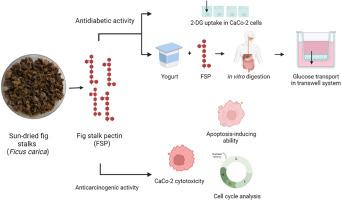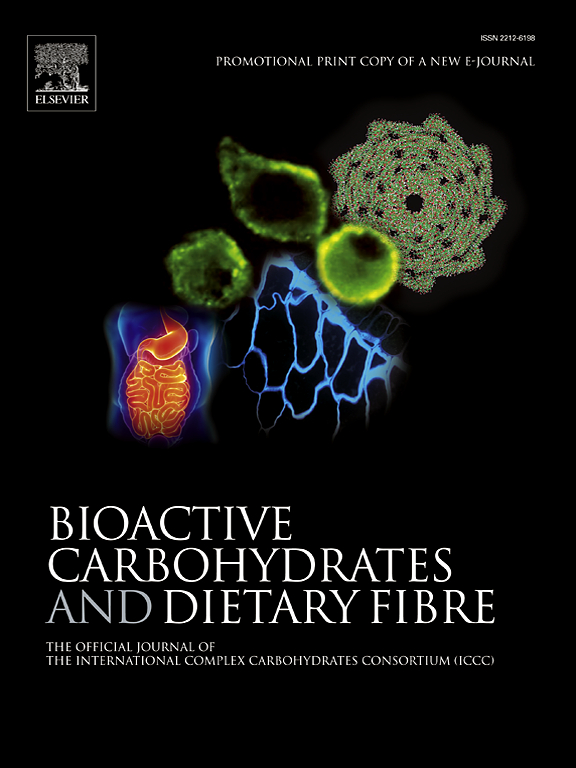晒干无花果(Ficus carica)茎秆果胶的抗糖尿病和抗癌特性:对肠道葡萄糖吸收和结肠癌细胞生长的影响
IF 3.6
引用次数: 0
摘要
本研究旨在探讨无花果茎秆果胶在抗糖尿病和抗癌方面的生理活性。此外,FSP的效力已被解释为酸奶中的功能性食品成分。半乳糖醛酸含量(65%)、酯化度(63%)和酶促糖分析表明,FSP是一种富含RG-I含量(~ 22%)的高甲氧基果胶。FSP的抗糖尿病特性表明,以2% (w/w)的浓度添加到酸奶中后,FSP抑制CaCo-2细胞对2-脱氧葡萄糖的摄取,减少肠道运输系统对葡萄糖的吸收。FSP的抗糖尿病活性是由于其能够以高水结合能力(10 g/g)改变酸奶的流变特性,并显著提高消化后酸奶样品的粘度(从89 Cp增加到110 Cp)。此外,抗癌特性表征表明,FSP通过干扰细胞周期进程,导致S期阻滞,并表现出诱导凋亡的能力,从而抑制结肠癌CaCo-2细胞的增殖。进一步的研究,包括体内和临床试验,是必要的,以验证观察到的健康益处的FSP。本文章由计算机程序翻译,如有差异,请以英文原文为准。

Antidiabetic and anticancer properties of sun-dried fig (Ficus carica) stalk pectin: effects on intestinal glucose absorption and colon cancer cell growth
This study aims to characterize the physiological activity of fig stalk pectin (FSP) in terms of antidiabetic and anticancer activities. Also, the potency of FSP has been interpreted as a functional food ingredient in yogurt. The galacturonic acid content (65 %), degree of esterification (63 %), and enzymatic sugar analysis showed that FSP is a high methoxyl pectin rich in RG-I content (∼22 %). Anti-diabetic characteristics of FSP demonstrated that FSP inhibited 2-deoxyglucose uptake into CaCo-2 cells and reduced glucose absorption in the intestinal transport system after being added as an ingredient in yogurt at the concentration of 2 % (w/w). The antidiabetic activity of FSP was attributed to its capacity to modify the rheological properties of yogurt with a high-water binding capacity (10 g/g), and it increased the viscosity of digested yogurt samples considerably (from 89 to 110 Cp). Moreover, the characterization of anticancer properties showed that FSP inhibited the proliferation of colon cancer CaCo-2 cells by disturbing cell cycle progression, leading to S phase arrest, and showing apoptosis-inducing ability. Further research, including in vivo and clinical trials, is necessary to validate the observed health benefits of FSP.
求助全文
通过发布文献求助,成功后即可免费获取论文全文。
去求助
来源期刊

Bioactive Carbohydrates and Dietary Fibre
Agricultural and Biological Sciences-Food Science
CiteScore
6.00
自引率
0.00%
发文量
38
期刊介绍:
 求助内容:
求助内容: 应助结果提醒方式:
应助结果提醒方式:


